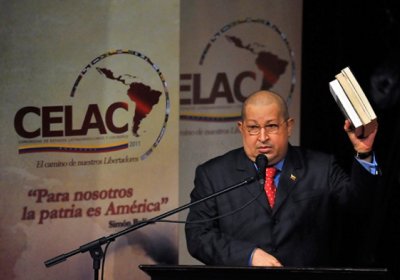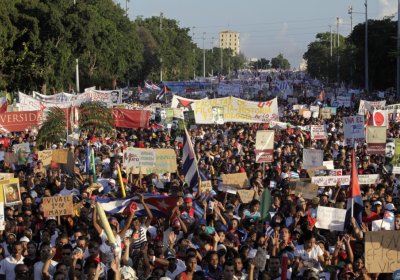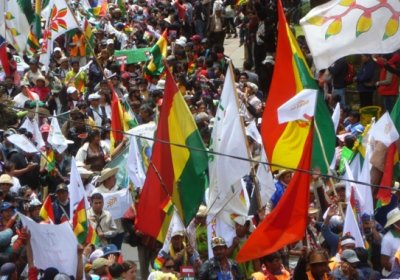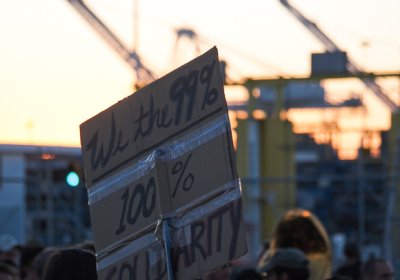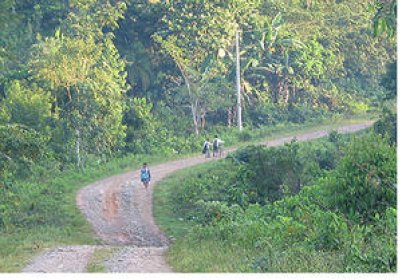Despite the crushing victory of incumbent Cristina Fernandez de Kirchner in the October 23 Argentine presidential elections, the campaign and results also demonstrated that an important social and political left alternative continues to exist.
The unpredictable consequences of the global economic crisis and the reaction by Cristina’s mixed social base to future policy decisions may prove important challenges to her new government.
Latin America & the Caribbean
A summit of huge importance was held in Venezuela on December 2-3. Two hundred years after Latin America’s independence fighters first raised the battle cry for a united Latin America, 33 heads of states from across the region came together to form the Community of Latin American and Caribbean States (CELAC).
For Latin America, the summit represented a further step away from its traditional role as the United States’ backyard and its emergence as a player in its own right in international politics.
Resources
The Sixth Congress of the Cuban Communist Party (PCC), held April 17-21, coincided with the 50th anniversary of Cuba’s historic defeat of the US-backed invasion at the Bay of Pigs and Fidel Castro’s proclamation of the socialist character of the Cuban Revolution.
When Fidel, 85, made a surprise appearance at the Congress closing session, many of the thousand delegates were overcome with emotion as aides helped him to his seat next to President Raul Castro.
Seven years after being launched by the Venezuelan and Cuban governments, the Bolivarian Alliance for the Peoples of Our Americas (ALBA) has become an important voice on the global stage willing to stand up and denounce capitalism.
ALBA has grown to include eight Latin American and Caribbean countries (Venezuela, Cuba, Bolivia, Ecuador, Nicaragua, Antigua and Barbuda, Dominica, Saint Vincent and the Grenadines.
Despite the government reaching an agreement with indigenous protesters on all 16 demands raised on their 10-week march onto the capital, La Paz, the underlying differences are far from resolved.
The recent march in Bolivia by some indigenous organisations against the government’s proposed highway through the Isiboro Secure National Park and Indigenous Territory (TIPNIS) has raised much debate among international solidarity activists.
Venezuelan President Hugo Chavez has ordered the expropriation of the British agricultural company Agroflora.
The company is a subsidiary of Britain’s Vestey Group that focuses on the commercial production of beef.
Chavez said the company’s 290,000 hectares of farmland would be expropriated and brought under direct “operational and administrative control” of the state through the country’s Food Security and Sovereignty Law.
This law allows the government to forcefully expropriate land in “exceptional circumstances” relating to issues of national food security and the public good.
“The crisis of the capitalist system has provoked the indignados movement [the ‘outraged’, as they are known in Spain] that has arisen in one country after another across the globe,” Elisa Osori, a national directorate member of the United Socialist Party of Venezuela (PSUV) said.
The PSUV is a mass party headed by Venezuelan President Hugo Chavez. A revolutionary process in Venezuela is redistributing the nation’s oil wealth, bring industries and resources under public ownership and promoting direct, participatory democracy.
The Venezuelan government returned more than 15,800 hectares of ancestral lands to the indigenous Yukpa people on October 12, as Venezuela celebrated “Indigenous Resistance Day” with public events and marches across the country.
Originally designated by then-US president Franklin Roosevelt as “Columbus Day” in 1937, October 12 is the date that Christopher Columbus first “discovered” the Americas.
The anniversary was re-named “Day of Indigenous Resistance” by Venezuelan President Hugo Chavez in 2002 to commemorate indigenous struggle against European invasion and colonisation.
Venezuela’s socialist president Hugo Chavez has likened the Occupy Wall Street movement in the United States to Venezuela’s February 1989 Caracazo riots against neoliberal policies that are widely seen as the start of Venezuela's revolutionary process.
Chavez made the comments by phone on the television program Dando y Dando on October 5.
September 25 will go down as one of the darkest days in Bolivia since Evo Morales was elected as the country’s first indigenous president almost six years ago.
After more than 40 days of indigenous protesters marching, police officers moved in to repress those opposed to the government’s proposed highway that would run through the Isiboro-Secure National Park and Indigenous Territory (TIPNIS).
The controversial highway has met with both opposition and support from the many indigenous and social organisations that form the Morales government’s support base.
September 25 will go down as one of the darkest days in Bolivia since Evo Morales was elected as the country’s first indigenous president almost six years ago.
- Previous page
- Page 115
- Next page

